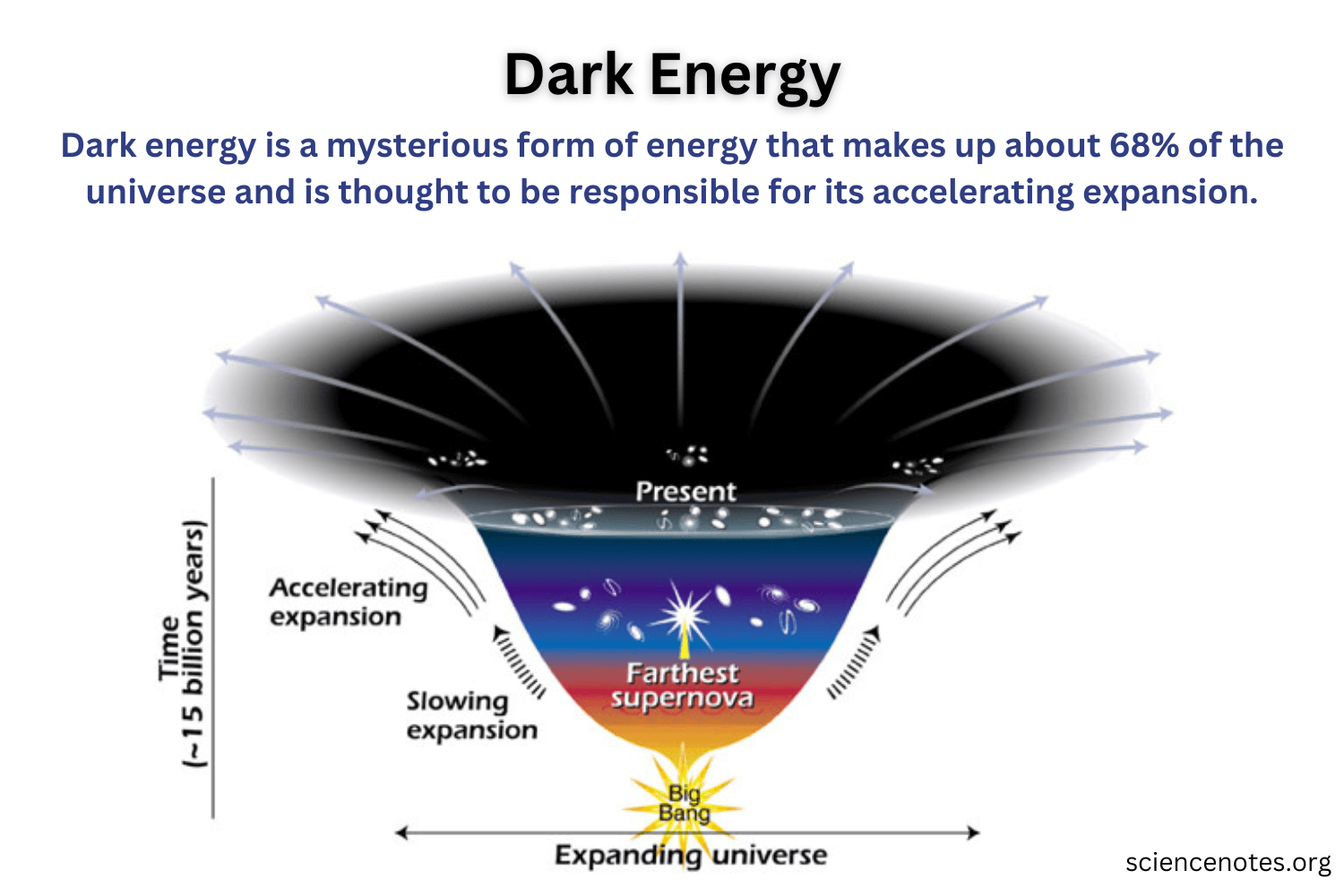Dark energy is one of the most enigmatic forces in the universe, representing a significant portion of our cosmos and influencing its very fate. Researchers from the DESI collaboration, which includes prominent scientists from institutions like Harvard, are investigating its effects, particularly how it drives the accelerated expansion of the universe. Recent findings suggest that this elusive energy, traditionally viewed as a constant, may be diminishing over time, prompting a reevaluation of our understanding of cosmic dynamics. This pivotal research not only informs us about the balance between dark energy and matter but also has profound cosmological implications for the evolution of galaxies. As we delve deeper into the mysteries of dark energy, we edge closer to revealing the ultimate fate of our universe, a subject that captivates astronomers and cosmologists alike.
The study of dark energy encompasses an exploration into the unknown aspects of our universe and the driving forces behind its continuous expansion. Often referred to as the mysterious component influencing cosmic dynamics, this subject utilized innovative tools developed through the global collaboration of scientists known as DESI. Their research is vital in understanding the changing landscape of this phenomenon, which has significant repercussions on galaxy formation and distribution within the cosmic web. As we uncover new data, the implications extend far beyond theoretical physics, prompting questions about the very structure and future of the universe itself. Engaging with these concepts may lead us toward new paradigms in cosmology and a deeper comprehension of the universe’s expansion.
Understanding Dark Energy: The Key to Cosmic Expansion
Dark energy is a mysterious force that constitutes about 68% of the total energy density of the universe, driving its accelerating expansion. Recent studies from the Dark Energy Spectroscopic Instrument (DESI) collaboration have raised critical questions regarding the nature of dark energy. While traditionally viewed as a cosmological constant—an unchanging energy density filling space uniformly—there is growing evidence suggesting that dark energy might be weakening over time. This finding challenges the conventional models of cosmology and suggests that our understanding of the universe’s expansion may need a significant reevaluation.
As we delve deeper into the evolution of galaxies and their interaction with dark energy, the implications are vast. The DESI project provides astronomers with unprecedented access to data about over 14 million galaxies and quasars, offering a 3D map that reveals the influence of dark energy over an astonishing 11 billion years. By analyzing the Baryon Acoustic Oscillations—patterns left from the early universe—scientists can measure how the expansion rate has changed, particularly in light of dark energy’s dynamics. Such insights are fundamental in predicting the ultimate fate of our universe.
The Role of DESI Collaboration in Cosmic Discoveries
The Dark Energy Spectroscopic Instrument (DESI) collaboration represents a significant advancement in our understanding of cosmology. With over 900 researchers from more than 70 institutions worldwide, the collaboration seeks to answer fundamental questions about the universe’s structure and expansion by collecting detailed observations of cosmic objects. The DESI team’s ability to analyze vast amounts of data from galaxies enables a more refined understanding of dark energy’s effects on the universe and suggests potential variations over time. This groundbreaking work promises to illuminate the underlying principles governing cosmic evolution.
As a member of the DESI collaboration, the Center for Astrophysics | Harvard & Smithsonian has played a crucial role in the analysis and interpretation of findings. Researchers such as Daniel Eisenstein have contributed to developing algorithms that enhance data interpretation, while specialists like Cristhian Garcia Quintero focus on unpacking the cosmological implications derived from the results. The collective expertise within the DESI collaboration empowers scientists to advance our knowledge of not only dark energy but also galaxy formation and the intricate web of structures throughout the cosmos.
Implications of Changing Dark Energy Dynamics
The changing nature of dark energy presents significant implications for our understanding of the universe. If dark energy is indeed weakening as suggested by recent findings, this could lead to a slowdown in the universe’s expansion, altering our predictions for future cosmic events. The standard models of cosmology, which have served as the backbone of our understanding for decades, may require substantial modification. Researchers are faced with the challenge of reconciling these new insights with established theories, potentially transforming our grasp of fundamental cosmic processes.
The DESI collaboration’s ongoing investigation of dark energy’s impact on cosmic expansion and its interplay with matter distribution further emphasizes the need for rigorous exploration in this field. Continuous analysis of data from millions of celestial objects will undoubtedly yield further revelations about how dark energy affects the evolution of galaxies. This nuanced understanding could reshape our interpretations of the universe’s overall structure and highlight the essential role of dark energy as a driving force behind cosmic expansion.
Dark Energy’s Role in the Evolution of Galaxies
The interaction between dark energy and galaxy evolution is a pivotal area of study within cosmology. As dark energy influences the expansion of the universe, it also plays a crucial role in shaping the formation and distribution of galaxies over cosmic time. Observational data obtained from the DESI collaboration sheds light on how various galaxies and their clusters evolve under the influence of dark energy. The relationship between dark matter and dark energy can reveal patterns in the cosmic web, illustrating the dynamic processes that govern galaxy formation.
By examining the large-scale structure of the universe, researchers can trace the history of galaxy evolution back over billions of years. Such studies not only illuminate how galaxies interact with dark energy but also provide insights into the initial conditions set during the universe’s formation. Understanding these mechanisms is essential for forging a comprehensive picture of cosmic evolution and answering broader questions about the universe’s fate as influenced by the elusive force of dark energy.
Exploring the Expansion of the Universe with DESI
The exploration of the universe’s expansion is significantly enhanced by the observations and analyses conducted through the DESI project. By mapping the cosmos meticulously over a large volume of space and time, scientists can better grasp how the universe has expanded since its inception. The integration of data from billions of galaxies allows researchers to measure the rate of expansion and, crucially, how this rate has been influenced by the presence of dark energy. Such knowledge is vital for understanding the long-term trajectory of the cosmos.
As the DESI project continues its work, researchers are utilizing advanced techniques to analyze the intricate interplays between different cosmic components, particularly focusing on how dark energy affects expansion rates in various epochs of the universe. This ongoing survey not only enhances our cosmic understanding but also arms astronomers with the tools needed to anticipate future trends in the universe’s behavior, solidifying dark energy as a central piece in the puzzle of cosmic dynamics.
The Importance of Data Release in Cosmological Research
The recent Data Release 1 from the DESI collaboration provides an invaluable resource for researchers in cosmology and astrophysics. The dataset, containing detailed observations of millions of celestial objects, opens up new avenues for exploration and study. By making this information accessible to the public, DESI promotes transparency and collaboration within the scientific community, inviting a broader range of insights and interpretations that can refine our understanding of dark energy and the universe it governs.
Researchers now have the opportunity to engage with the data on a level that can spark innovative approaches to studying dark energy and its effects on cosmic structures. As scientists from various disciplines analyze the diverse datasets, new trends and patterns may emerge, contributing to the ongoing dialogue about dark energy and expansion dynamics. This democratization of data is a critical step in advancing cosmological research and fostering a collaborative environment that encourages the generation of novel hypotheses about the universe.
Cosmic Web: The Structure Shaped by Dark Energy
The cosmic web, a vast structure of galaxies, clusters, and dark matter, is intricately shaped by the influence of dark energy. This web-like arrangement demonstrates how matter and energy coexist and interact across the universe, with dark energy playing a pivotal role in determining the distribution of galaxies. The research from the DESI collaboration helps delineate the relationship between dark energy and the structure of the cosmos, offering deeper insights into how dark energy governs the formation of these intricate patterns.
By understanding the cosmic web’s formation and evolution, astronomers can gain insights into the fundamental principles guiding the universe’s expansion. As dark energy drives the increasing distances between galaxy clusters, studying this phenomenon allows for a more profound comprehension of both dark energy and the gravitational forces at play. The evolving dynamics of the cosmic web showcase how dark energy’s influence weaves through the fabric of space, shaping the universe into the great cosmic tapestry we observe today.
Public Engagement and Education in Astrophysics
The DESI collaboration not only focuses on groundbreaking astrophysical research but also emphasizes the importance of public engagement and educational outreach. Through initiatives led by researchers such as Claire Lamman, the project aims to foster a deeper understanding of cosmology and dark energy among the general public. Education plays a vital role in connecting complex scientific concepts with audiences, making astronomy more accessible and engaging for students and enthusiasts alike.
By creating visual materials and interactive content, the DESI collaboration encourages public curiosity and participation in ongoing astronomical investigations. This outreach is essential for inspiring future generations of scientists and enthusiasts, as it brings the mystery of dark energy and the cosmic universe directly into the lives of individuals. Ultimately, by cultivating interest and knowledge about dark energy and cosmological research, we pave the way for a new era of scientific discovery and appreciation in the field of astrophysics.
Frequently Asked Questions
What is dark energy and how does it relate to the universe’s expansion?
Dark energy is a mysterious force that is thought to be responsible for the accelerated expansion of the universe. It is often described as a ‘cosmological constant’, influencing how fast galaxies move apart from each other. Recent studies, including those from the DESI collaboration, suggest that dark energy may be changing over time, prompting a reevaluation of our understanding of the universe’s expansion.
How does the DESI collaboration study dark energy?
The Dark Energy Spectroscopic Instrument (DESI) collaboration studies dark energy by creating an extensive 3D map of the universe. By analyzing the distribution of over 14 million galaxies and quasars, scientists can measure patterns in the universe known as Baryon Acoustic Oscillations, which help gauge the effects of dark energy over billions of years.
What are the cosmological implications of changing dark energy?
If dark energy is weakening as recent findings from the DESI collaboration suggest, it could have significant cosmological implications. This may indicate a shift in the fundamental model of the universe, affecting predictions regarding its ultimate fate and the evolution of galaxies.
How does dark energy affect galaxy evolution?
Dark energy influences the rate of cosmic expansion, which affects the evolution of galaxies. As the universe expands more rapidly due to dark energy, galaxies are influenced in their formation and distribution, potentially altering the growth patterns observed in the cosmic web.
What future research directions are being pursued regarding dark energy?
Future research in dark energy will focus on the data released from the DESI collaboration, allowing scientists to explore its effects on the universe’s structure and expansion. Investigations into the dynamics of dark energy will help clarify its role in cosmic evolution and guide models for the universe’s fate.
| Key Point | Details |
|---|---|
| Collaboration | The Dark Energy Spectroscopic Instrument (DESI) involves over 900 researchers from more than 70 institutions globally. |
| Role of CfA | Astronomers from the Center for Astrophysics | Harvard & Smithsonian play a crucial role in the analysis of dark energy through the DESI project. |
| New Findings | Recent results suggest that dark energy might be weakening, indicating potential updates to the standard model of the universe. |
| Data Utilized | The study analyzed data from over 14 million galaxies and quasars, utilizing the largest 3D map of the universe. |
| Impact Assessment | Research suggests that the strength of dark energy may be changing over time, indicating complexities in the universe. |
| Public Engagement | The DESI Data Release 1 is accessible for public exploration and aims to engage in astrophysical research. |
| Future Research | CfA researchers investigate galaxy evolution, cosmic web, and Milky Way structure through ongoing DESI surveys. |
Summary
Dark energy plays a critical role in our understanding of the universe, as recent findings from the DESI collaboration suggest that it might be weakening over time. This suggests that the current model of cosmology could require significant revisions, and the continuing research into dark energy and its effects is essential for predicting the future evolution of the universe. By examining vast amounts of cosmic data, scientists are uncovering the intricate dynamics between dark energy and matter, enhancing our comprehension of the cosmos.



